Gardening for Abundance and Generosity
Air Date: Week of May 7, 2021
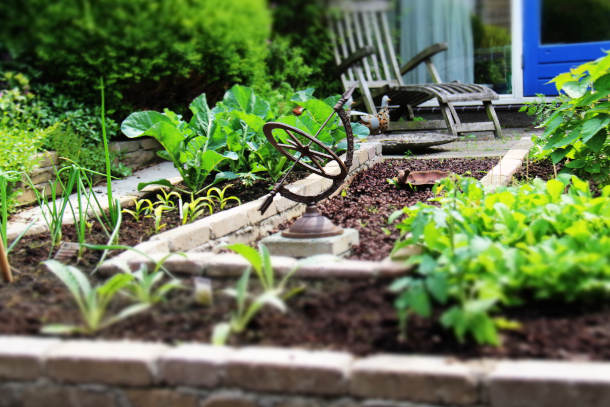
As the weather warms, gardening newcomers and aficionados alike look forward to what will be growing. (Photo: Hans Splinter, Flickr, CC BY-ND 2.0)
As the weather warms at her New England home, Host Bobby Bascomb catches up with landscape designer Michael Weishan for some tips for gardens in her region as well as some general advice for gardening newcomers and aficionados all over the US. Their chat looks forward to tending to what's growing in window boxes, raised beds, and greenhouses, and how gardening fosters a spirit of generosity.
Transcript
BASCOMB: For many northern gardeners, like me, spring means we are counting down the days till Memorial Day when the danger of frost has finally passed and we can get planting. So, it seems like a good time to check in with our resident gardening guru Michael Weishan. Michael is a landscape designer, veteran of Living on Earth, and former host of the Victory Garden on PBS. Michael, welcome back to Living on Earth!
WEISHAN: I am delighted to be back. Happy spring,
BASCOMB: Happy spring. It's May and a few weeks till our last frost here in New England, when it's safe to plant outside. What are you up to right now in the garden, though?
WEISHAN: You know, this week is supposed to be pretty rainy. So I'm going to be in the greenhouse working with seeds. And that's one of the things I wanted to talk with you guys about today for various reasons. One of which is that I'm a huge proponent of growing things from seeds, because of the carbon cost involved. Growing your own really cuts a huge amount of the oil and gas out of the process. So anything that you can grow yourself, you're not only going to save a ton of money, because Bobby, if you've been to the nursery lately -
BASCOMB: I have.
WEISHAN: - you'll know where the prices have gone. It's just incredible. So as a money saving thing, as a planet saving thing. It's really great to grow seeds. But what's really great about it to me is that you get to try things that you would normally not get a chance to try or you won't see in the stores. So I've actually just pulled a number of packets here today to talk about some of the fun things that I'm going to grow. And that some of our listeners may want to grow as well. And that, by and large, there's still time to do. So which one of these wonderful things do you want to start with? Because I'm excited to talk about all of them.
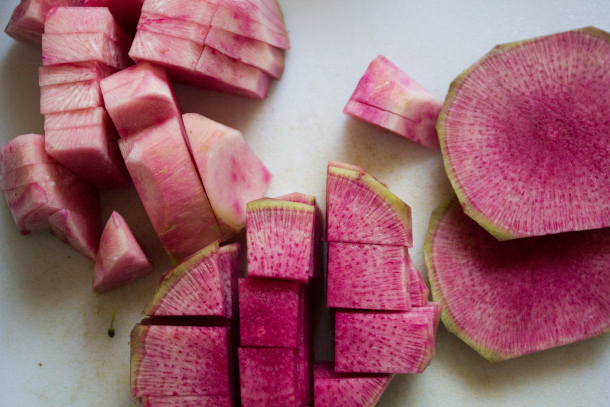
Chinese Red Meat Radish, also known as “watermelon radish” are known for their bright, rose-red center. (Photo: Quinn Dombrowski, Flickr, CC BY-SA 2.0)
BASCOMB: Oh, well, I don't know, alphabetical or your favorite, you decide.
WEISHAN: Alright, so I'm going to start with this one. Radish. Chinese Red Meat is a type of daikon. It's called "watermelon radish" as a nickname. And I think it's absolutely fantastic slightly pickled. I've grown this last year, I'm going to grow this again. Kids love it because it is this bright red color inside, it is absolutely fantastic looking. And it's really super easy to grow. It's to just kind of plant and push and they pop up. The seeds are widely available through mail order. And if you like something a little spicy - are you spicy person, Bobby?
BASCOMB: Somewhat, somewhat, you know, I have to say though, I've had very little success with radish. Maybe I tried them too early? Maybe this is the time I was probably you know -
WEISHAN: No, this is the time because they're cool weather plants generally. Generally they, the problem is that they don't go well in cold weather. This one however, this daikon actually is sown later in the season. So that's one of the reasons I wanted to talk about it today. Planting instructions: plant in late summer for harvest after the winter begins to cool. So you know, we've got quite a time to go in front of that.
BASCOMB: Yeah, sure.
WEISHAN: I want to talk also about broccoli rapini. Now do you know rapini?
BASCOMB: I think I've had it before, I've certainly never tried to grow it though.
WEISHAN: Well, I have terrible luck growing broccoli because the moths get into the heads and the head split, and I don't know, it just, I've had terrible time. So I've not been a successful broccoli grower. So I'm going to try this. It's an Italian non heading broccoli, grown for the flavorful - I'm reading from the packet - asparagus-like spring shoots and leaves. It's planted now and and cool weather and it should be fairly fast growing. So I would expect to harvest in about 60 days or so.
BASCOMB: Wow.
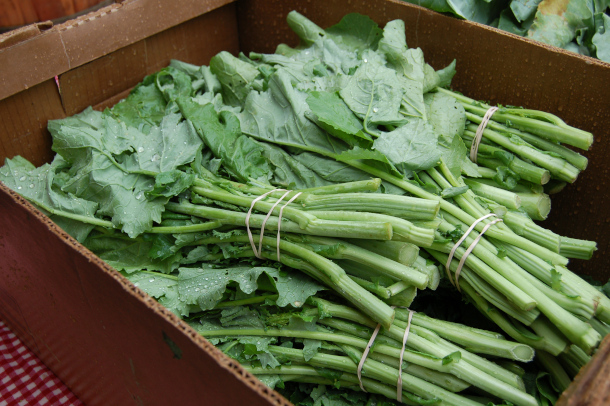
Rapini, also known as broccoli rabe, is a popular ingredient in many Mediterranean cuisines. (Photo: Dana McMahan, Flickr, CC BY-NC 2.0)
WEISHAN: So we'll see.
BASCOMB: That's really quick.
WEISHAN: Great salad, you know, great, great cooked vegetable kind of thing.
BASCOMB: Now, do you save seeds as well in the fall from your own plants?
WEISHAN: Well, no. And I'll tell you why. Because we grow a lot of hybrids. And obviously you have to start afresh with hybrid seed. I'll tell you a funny story though. I have been friends since my Victory Garden days with Amy Goldman who's a well known horticulturist in from New York who has produced wonderful books on tomatoes and squash, and just an incredible horticulturist. As a matter of fact, she has a tomato named after her. "Green Doctors" is named after Dr. Amy Goldman and one of her research companions. So she's been a friend of mine since the Victory Garden days. And she came and brought one time to film these incredible round bottle gourds. And they are perfectly round. I have a whole set on one of my shelves that she left with me. It's a big papa gourd, which is a perfectly rounded, you know, foot and a half and mama and then three little trailing children. And I've used them for decorations for years and I called Amy up. I said, do you still have the seeds for this? And she said, no, I don't. And they seem to have passed out of production. I said, do you think those seeds are still viable? In that gourd? Now, we filmed this in 2003. So you know, this is 18 years sitting in that gourd? She said, yeah, I think so. I think they would probably go if you gave them a little soaking and tender loving care. So I carefully drilled a hole about a week and a half ago in the bottom of this gourd and there were hundreds of seeds in there. And so now they're in the greenhouse, I've soaked them. And I'm waiting to see the result. I don't know but I tell you this will reaffirm my faith in God, or at least the gardening God, if these things sprout after sitting on my shelf for 18 years, granted in an airtight container, but nonetheless, I think that is just a remarkable destiny story if it works, so stay tuned, listeners.
BASCOMB: You'll have to come back in a couple months and tell us how that panned out if they germinated for you or not. Well, you know I have a story for you actually, a friend of mine recently gave me a couple of dried up marigold flowers from her garden. And each flower holds, you know, dozens of seeds. She got them from her mom who's been saving the seeds from the same plant since the 1970s and she originally planted these, I think she calls them cinnamon marigolds, because the red color of the flower was the same color as her baby daughter's hair. She's a redhead. And so she's been growing them every year, saving the seeds every year, re-planting them. And now the friend that gave them to me is that baby daughter all grown up. And I just love that, you know, I love those types of stories.
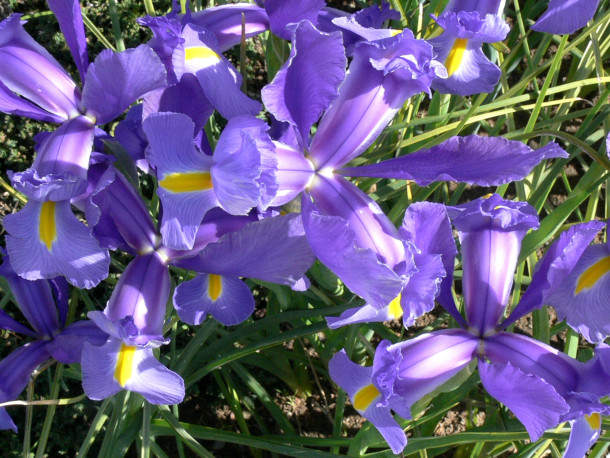
Iris, like the ones that Michael Weishan grew with his grandfather, will bloom in the spring and summer months. (Photo: Linda Tanner, Flickr, CC BY-NC-ND 2.0)
WEISHAN: I have a number of plants that have been passed down to me, I have a wonderful potted begonia of a extremely archaic type that I don't even know what it is, that is well over 120 years old. It came down to a friend of mine, who's now passed away a number of years ago, in her 80s. And she got it from her grandfather, so probably around 1870 or so. And I think of her every time it blooms, it's just it's, it's it's a wonderful tuberous type, begonia. And we were talking earlier about what I was, what I was doing. Just before we came on air here, I was out digging up iris, those iris are some direct descendants of my grandfather's iris that I grew up with. That's how I learned gardening. He was a fairly well noted hybridizer and hugely interested in iris and day lilies. And that's how I cut my gardening teeth. So some of those are the actual plants or descendants thereof, that were growing in his garden. And every time they bloom, which is going to be in a couple of weeks' time, they put on a spectacular show, really unrivaled I think in the gardening world. And I'm once again back on South 27th Street in Milwaukee in those wonderful May days with my grandfather. So I am a huge advocate of heirloom plants, not in the heirloom sense of old varieties, but in actually passing things down along to other people that care about them.
BASCOMB: Yeah, exactly. And, you know, I love these stories, you know, I love the idea that every plant has a story and that you can trace its roots, you know, pardon the pun, back so far. You know, it's something I've gotten really into in the last year are there's so many different Facebook groups that are local to where you are, at least local to where I am. And I assume this is true across the country of you know, sharing plants, swapping perennials, or if you just have a group of gardening friends, inevitably, you have too many zucchini seeds and not enough tomatoes or whatever. It's wonderful just to have a group of people that you can share resources with and not have to buy more.
WEISHAN: Absolutely, you know, interestingly, as a product of COVID. And this is a very bizarre, you know, alignment. The number of people, obviously, that I see dropped precipitously during the last year. But within our small little group, we're all fairly avid gardeners. So we started to split up the growing responsibilities for a lot of the plants we started. Now, I happen to have a greenhouse, I'm the only one that does, but they all have growing lights and growing spaces. So rather than, you know, go out to the stores and things we have grown a lot of this stuff ourselves and created this sort of little nursery co-op, as it were. And of course, you know, I'm gonna say this on air, my dear friend, Patty is a little plant crazed. And she's one of my chief operators in crime on this. And she insists whenever she has a packet of seeds, she has to plant the entire packet. There is no saving the seeds for Patty. You know, every child has a chance to be free, right?
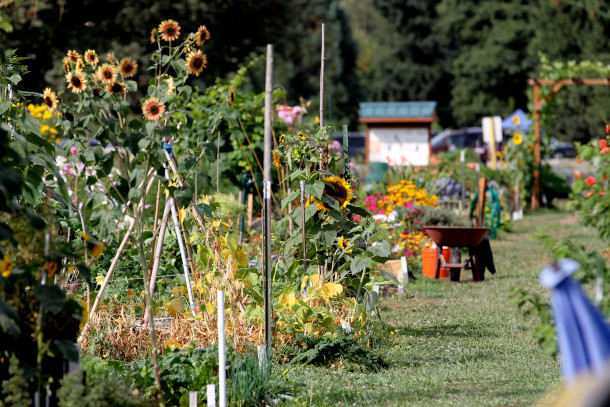
Donating seeds to community gardens and produce to food banks are great ways to connect with the larger gardening community in your area. (Photo: King County Parks, Flickr, CC BY-NC-ND 2.0)
BASCOMB: Oh, my gosh.
WEISHAN: I think she thinks of every seat as sort of like an a child in prison. So I got some coleus from her the other day, and they were in two little six packs. And each each little tiny six pack, it turns out there were like six or eight tiny little coleus. I said, Patty, you cannot plant this many seeds. "Oh, but I just I love the plants." So we have hundreds of plants leftover that we give away to friends and family and people at the community garden here we support. You know, the folks that can't grow their own. One thing also that we've started to do a lot of last year was to give away extra food to the food banks. There was and continues to be tremendous need. I know the economy is recovering and booming and stocks are booming. But the bottom quarter of the economy and of our our citizenry are still in really desperate straits. A lot of these industries have not reopened the service industries. And it's going to take years and it's entirely possible some of these jobs are never coming back. So the food banks have been doing absolutely booming, booming business for need, but not necessarily getting enough of what they actually could use. There's huge influxes of food at Thanksgiving and the holidays. But during the rest of the time, especially the summer, there's not a lot. So if you can grow extra produce and give it away, by all means.
BASCOMB: That's a wonderful idea.
WEISHAN: Well, you know, I have 18 apple trees, I'm one person right? Granted, I make a lot of cider. So during the non-COVID days, I would invite various groups, Boy Scouts or senior citizens support groups, whatever to come pick or for the food bank to come pick apples. And these trees produced, oh, I don't know, hundreds of bushels of apples. And so again, rather than having any of that wasted or composted, there's such a need for this type of stuff. Even zucchini, right? Everyone grows a thousand million zucchini. But if you don't have a garden and if you're in from the city and you are in a in a food desert, I mean these type of fresh produce for folks that don't have the ability to grow this or buy it. These are gifts from heaven. So give your produce away.
BASCOMB: Michael Weishan is a landscape designer and former host of the Victory Garden. Michael, thanks so much for joining me again today. It's been so much fun.
WEISHAN: Bobby, it is always a pleasure to talk to you and to be back here on Living on Earth.
BASCOMB: Oh, the pleasure is mine. Believe me.
Links
Learn more about Michael Weishan
Living on Earth wants to hear from you!
Living on Earth
62 Calef Highway, Suite 212
Lee, NH 03861
Telephone: 617-287-4121
E-mail: comments@loe.org
Newsletter [Click here]
Donate to Living on Earth!
Living on Earth is an independent media program and relies entirely on contributions from listeners and institutions supporting public service. Please donate now to preserve an independent environmental voice.
NewsletterLiving on Earth offers a weekly delivery of the show's rundown to your mailbox. Sign up for our newsletter today!
 Sailors For The Sea: Be the change you want to sea.
Sailors For The Sea: Be the change you want to sea.
 The Grantham Foundation for the Protection of the Environment: Committed to protecting and improving the health of the global environment.
The Grantham Foundation for the Protection of the Environment: Committed to protecting and improving the health of the global environment.
 Contribute to Living on Earth and receive, as our gift to you, an archival print of one of Mark Seth Lender's extraordinary wildlife photographs. Follow the link to see Mark's current collection of photographs.
Contribute to Living on Earth and receive, as our gift to you, an archival print of one of Mark Seth Lender's extraordinary wildlife photographs. Follow the link to see Mark's current collection of photographs.
 Buy a signed copy of Mark Seth Lender's book Smeagull the Seagull & support Living on Earth
Buy a signed copy of Mark Seth Lender's book Smeagull the Seagull & support Living on Earth

